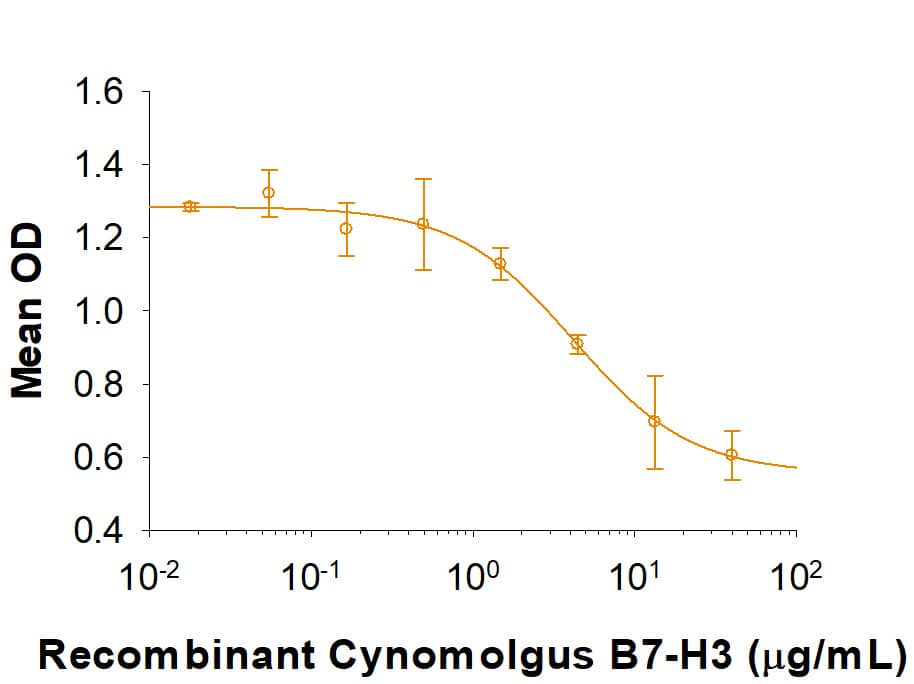Recombinant Cynomolgus Monkey B7-H3 Protein, CF Summary
Product Specifications
Gly27 & Leu29-Thr461, with a C-terminal 6-His tag
Analysis
Product Datasheets
Carrier Free
CF stands for Carrier Free (CF). We typically add Bovine Serum Albumin (BSA) as a carrier protein to our recombinant proteins. Adding a carrier protein enhances protein stability, increases shelf-life, and allows the recombinant protein to be stored at a more dilute concentration. The carrier free version does not contain BSA.
In general, we advise purchasing the recombinant protein with BSA for use in cell or tissue culture, or as an ELISA standard. In contrast, the carrier free protein is recommended for applications, in which the presence of BSA could interfere.
9426-B3
| Formulation | Lyophilized from a 0.2 μm filtered solution in PBS with Trehalose. |
| Reconstitution | Reconstitute at 200 μg/mL in PBS. |
| Shipping | The product is shipped at ambient temperature. Upon receipt, store it immediately at the temperature recommended below. |
| Stability & Storage: | Use a manual defrost freezer and avoid repeated freeze-thaw cycles.
|
Scientific Data
 View Larger
View Larger
Recombinant Cynomolgus Monkey B7‑H3 inhibits IFN-gamma secretion by human T cells in the presence of anti-CD3 antibody. The ED50 for this effect is 1-10 μg/mL.
Reconstitution Calculator
Background: B7-H3
Cynomolgus Monkey B7 homolog 3 (B7-H3), also known as CD276
antigen, is a member of the B7 family of immune proteins that provide signals
for the regulation of immune responses (1-3). Other family members include
B7-1, B7-2, B7-H1/PD-L1, B7-H2, and PD-L2. B7 family proteins are type I
transmembrane immunoglobulin (Ig) superfamily members that contain
extracellular Ig V‑like and Ig C-like domains with a short cytoplasmic tail.
Among the family members there is about
20‑40% amino acid (aa) sequence
identity. Cynomolgus monkey B7-H3 shares approximately 97% and 88% aa sequence
identity with human and mouse B7-H3 respectively. B7-H3 mRNA is found in various normal tissues
and in several tumor cell lines, but is not detectable in peripheral blood
mononuclear cells (PBMCs). Inflammatory cytokines, such as IFN gamma, and a
combination of phorbol myristate acetate (PMA) and ionomycin induce expression
of B7-H3 protein on dendritic cells (DCs) and monocytes (4). The receptor(s) for B7-H3 remains unknown.
Both murine and human B7-H3 fusion proteins fail to bind to resting T cells,
but can recognize activated T cells which stimulated with PHA or ConA,
indicating that B7-H3 receptors are induced upon T cell activation (5). B7-H3
was reported to act as a
co-stimulatory regulator to enhance the proliferation
of both CD4+ and CD8+ T cells, the induction of cytotoxic T cells, and IFN-gamma
production in the presence of TCR signaling (1). B7‑H3 was also reported to
play an inhibitory role on T-cell activation. The inhibition may govern through
nuclear factor of activated T cells (NFAT),
NF‑ kappa B, and AP-1 factors, three
major signaling pathways through which TCR regulates gene transcription, which
suggesting that B7‑H3 might have more than one receptor on T cells (6). B7-H3
protein expresses on a wide variety of cancers, including stomach, lung,
prostate, kidney, ovary, pancreas, liver, bladder and breast. The role of B7-H3
in anti-tumor immunity is controversial, because B7-H3 has conflicting costimulatory
and coinhibitory functions (7).
- Chapoval, A.I. et al. (2001) Nat. Immunol. 2:269.
- Sharpe, A.H. and G.J. Freeman (2002) Nat. Rev. Immunol. 2:116.
- Coyle, A. and J.Gutierrez-Ramos (2001) Nat. Immunol. 2:203.
- Kyung H. Yi and Lieping Chen. (2009) Immunol Rev. 229:145.
- Sun M, et al. (2002) J Immunol. 168:6294.
- Hofmeyer KA, et al. (2008) Proc Natl Acad Sci USA. 105:10277.
- Ni L and Dong C. (2017) Immunol Rev. 276:52.
FAQs
No product specific FAQs exist for this product, however you may
View all Proteins and Enzyme FAQsReviews for Recombinant Cynomolgus Monkey B7-H3 Protein, CF
There are currently no reviews for this product. Be the first to review Recombinant Cynomolgus Monkey B7-H3 Protein, CF and earn rewards!
Have you used Recombinant Cynomolgus Monkey B7-H3 Protein, CF?
Submit a review and receive an Amazon gift card.
$25/€18/£15/$25CAN/¥75 Yuan/¥2500 Yen for a review with an image
$10/€7/£6/$10 CAD/¥70 Yuan/¥1110 Yen for a review without an image
